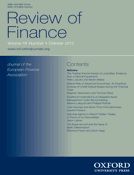
Review of Finance
Scope & Guideline
Pioneering high-quality research in finance and beyond.
Introduction
Aims and Scopes
- Corporate Finance and Governance:
Explores mechanisms of corporate governance, ownership structures, and their effects on firm performance, investment decisions, and risk management. - Behavioral Finance:
Investigates the psychological factors influencing investors' decisions and market outcomes, including sentiment analysis and cultural influences on financial behavior. - Financial Markets and Instruments:
Analyzes the dynamics of various financial instruments, market structures, and trading strategies, including the implications of liquidity, volatility, and market efficiency. - Risk Management and Financial Stability:
Focuses on systemic risks, the role of financial institutions, and the impact of macroeconomic factors on financial stability and risk management practices. - Environmental and Social Governance (ESG):
Examines the intersection of environmental sustainability, social responsibility, and corporate governance, emphasizing the financial implications of ESG practices. - Economic Policy and Financial Markets:
Explores the impact of economic policies, regulations, and macroeconomic conditions on corporate behavior, financial markets, and investment strategies.
Trending and Emerging
- Impact of Climate Change on Finance:
There is an increasing focus on how climate risks affect financial stability, corporate performance, and investment strategies, highlighting the urgency of integrating sustainability into financial decision-making. - Investor Sentiment and Behavioral Analysis:
Research on investor sentiment, including its effects on stock returns and trading behavior, has gained prominence, reflecting a broader interest in behavioral finance. - Corporate Social Responsibility (CSR) and ESG Investing:
The intersection of CSR practices with financial performance and investment decisions is increasingly being explored, driven by a growing emphasis on sustainability and ethical investing. - Market Reactions to Economic Policy Uncertainty:
The relationship between economic policy uncertainty and market reactions has become a hot topic, especially in light of recent global economic challenges. - Technological Advancements in Finance:
Emerging technologies, including machine learning, AI, and big data analytics, are increasingly applied to finance research, reshaping traditional methodologies and enhancing predictive capabilities.
Declining or Waning
- Traditional Portfolio Theory:
Research centered around classical portfolio management strategies has seen a decline, as newer methodologies like machine learning and behavioral finance gain traction. - Market Anomalies:
While initially a popular topic, studies investigating market anomalies have diminished as literature increasingly focuses on behavioral explanations and the integration of macroeconomic factors. - Conventional Risk Metrics:
The reliance on traditional risk metrics such as beta has waned in favor of more comprehensive measures that consider systemic risk and interconnectedness in financial systems. - Static Models of Financial Behavior:
Research employing static models to analyze financial behavior is becoming less prevalent, as dynamic and context-sensitive approaches gain favor among researchers. - Microeconomic Foundations of Finance:
Studies focusing solely on microeconomic aspects of finance are declining, as there's a growing emphasis on the interplay between micro and macroeconomic factors.
Similar Journals

International Review of Finance
Unveiling the complexities of finance and economics.International Review of Finance is a prestigious academic journal published by Wiley, located in the United Kingdom. With its ISSN 1369-412X and E-ISSN 1468-2443, this journal serves as an essential platform for researchers and practitioners in the fields of Economics and Finance. Ranked in the Q2 quartile for both Economics and Econometrics and Finance as of 2023, it showcases high-quality research that contributes significantly to theoretical and practical advancements. Reflecting its standing, the journal is positioned in the 61st percentile in Economics and Econometrics and the 60th percentile in Finance according to Scopus rankings. The scope of the journal includes a diverse range of topics, encouraging innovative discourse across various financial disciplines. Although it does not offer open access, the International Review of Finance continues to be an important resource for academics, professionals, and students seeking to deepen their understanding of evolving financial theories and practices.
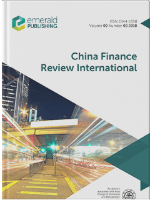
China Finance Review International
Pioneering Discussions on China's Financial EvolutionChina Finance Review International (ISSN: 2044-1398; E-ISSN: 2044-1401) is an esteemed journal published by Emerald Group Publishing Ltd, located in the United Kingdom. With a commendable Q1 ranking in the field of finance according to 2023 category quartiles, this journal has established itself as a leading platform for disseminating significant research in the realms of economics, econometrics, and finance, boasting a remarkable Scopus rank of #13 out of 317, placing it in the 96th percentile. The journal focuses on advancing the discourse surrounding financial issues related to China, making it essential reading for academics, professionals, and students eager to explore the dynamic shifts in this critical area of global finance. As it continues to bridge theoretical insights with practical applications, the China Finance Review International aims to foster a comprehensive understanding of financial mechanisms at play within one of the world's most impactful economies.
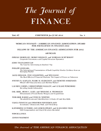
JOURNAL OF FINANCE
Your gateway to premier financial scholarship.JOURNAL OF FINANCE, published by Wiley, stands as a premier academic journal in the fields of finance, economics, and accounting. With a history dating back to 1946, the journal has consistently delivered impactful research that shapes financial theory and practice, boasting an impressive impact factor reflective of its high citation rate. Its Quartile 1 ranking in Accounting, Economics and Econometrics, and Finance illustrates its leading position within these disciplines. Although not an open access publication, the journal continues to be indispensable for researchers, professionals, and students seeking to advance their understanding and knowledge through rigorous empirical analysis and comprehensive reviews. With an esteemed global readership, the JOURNAL OF FINANCE remains committed to fostering the dissemination of innovative financial research well into 2024 and beyond.
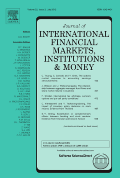
Journal of International Financial Markets Institutions & Money
Advancing Global Financial InsightsThe Journal of International Financial Markets, Institutions & Money, published by Elsevier, serves as a leading platform for the dissemination of high-quality research in the fields of finance, economics, and econometrics. With an impressive impact factor reflected in its status as a Q1 journal in both categories for 2023, it ranks among the top journals, positioned at #47 out of 317 in Finance and #111 out of 716 in Economics. This journal offers a unique focus on the interplay between financial markets and institutions on a global scale, making it an essential resource for scholars, practitioners, and students alike. The journal welcomes innovative theoretical, empirical, and applied research, contributing to an exciting dialogue that shapes the future of international finance. For researchers looking to publish their findings, this journal is committed to rigorously engaging with contemporary financial phenomena, positioning itself as a vital cornerstone of academic and professional discourse.
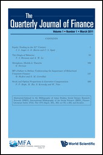
Quarterly Journal of Finance
Empowering Economic Discourse Through Rigorous ResearchThe Quarterly Journal of Finance, published by World Scientific Publishing Co. Pte Ltd, serves as a vital resource for the global academic community in the fields of Finance, Economics, and Strategy and Management. With an ISSN of 2010-1392 and E-ISSN 2010-1406, this journal boasts a respectable impact factor reflective of its standing, being ranked in the Q2 quartile across multiple categories in 2023. The journal's diverse scope includes innovative research and critical reviews that address current issues in financial practices and economic strategies, making it a pertinent platform for scholars and industry professionals alike. Despite its lack of open access, the journal's rigorous selection process ensures the publication of high-quality, impactful research. The Quarterly Journal of Finance is particularly distinguished for its commitment to advancing knowledge and fostering dialogues within its converging fields, proving to be an indispensable asset for researchers, professionals, and students eager to stay abreast of developments from 2011 to 2024 and beyond.
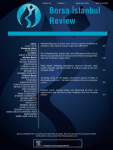
Borsa Istanbul Review
Illuminating trends in the world of finance.Borsa Istanbul Review, published by ELSEVIER, is a premier open-access journal making significant contributions to the field of Economics and Finance since its inception in 2013. With a commendable Q1 rating in both categories according to the 2023 metrics, this journal ranks impressively at #36 out of 317 in Finance and #91 out of 716 in Economics and Econometrics on Scopus, placing it in the top tier of international academic publications. The journal not only provides a platform for rigorous and innovative research but also aims to foster a deeper understanding of the evolving economic landscape, particularly within the frameworks of emerging markets. Catering to researchers, professionals, and students alike, Borsa Istanbul Review is dedicated to delivering high-quality, peer-reviewed scholarly articles that are freely accessible to enhance global research collaboration. It serves as an essential resource for anyone looking to stay abreast of cutting-edge developments in the financial and economic sectors.

International Journal of Financial Studies
Elevating finance scholarship with every publication.The International Journal of Financial Studies is a premier publication dedicated to advancing the field of finance through open-access research. Published by MDPI based in Switzerland, this journal offers researchers, professionals, and students a platform to disseminate their findings in an accessible format since its establishment in 2013. With its ISSN of 2227-7072 and a commendable impact reflected in its Q2 ranking in finance, it occupies an influential position among finance-related journals, as evidenced by its 65th percentile rank in Scopus. The journal encompasses a wide array of topics in finance, making it essential reading for those seeking to stay abreast of current research trends and methodologies. As an open-access journal, all articles are freely available, significantly enhancing the visibility and reach of published studies, which is crucial for fostering collaboration and innovation within the global financial community. Published continuously until 2024, the International Journal of Financial Studies is not just a source of knowledge; it is a critical contributor to the progression of financial scholarship.
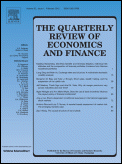
QUARTERLY REVIEW OF ECONOMICS AND FINANCE
Connecting Theory with Practice in FinanceQuarterly Review of Economics and Finance is a renowned academic journal published by Elsevier Science Inc. that focuses on key advancements in the fields of economics, econometrics, and finance. With a commitment to fostering scholarly dialogue, this journal provides a platform for researchers and practitioners alike to disseminate innovative ideas and empirical research, contributing to the economic discourse since its inception in 1992. Recognized for its quality, the journal holds an impressive Q2 ranking in both Economics and Econometrics and Finance, with Scopus rankings placing it in the 81st percentile, underscoring its relevance and impact within the scholarly community. While the journal operates under a subscription model, it boasts a global readership and is accessible to professionals and students seeking insightful and rigorous analyses of contemporary economic issues. With its clear objectives of expanding knowledge and influencing practice, the Quarterly Review of Economics and Finance serves as an essential resource for anyone committed to understanding the dynamics of economics and finance in the modern world.
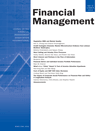
FINANCIAL MANAGEMENT
Shaping the Future of Financial Management ResearchFINANCIAL MANAGEMENT is a premier academic journal published by Wiley, focusing on the intricate domains of Accounting, Economics, and Finance. With an ISSN of 0046-3892 and an E-ISSN of 1755-053X, this esteemed journal has made significant contributions to the global discourse on financial practices and theories since its establishment in 1996. Situated within the top tier (Q1) in its respective fields, FINANCIAL MANAGEMENT ranks impressively in Scopus, positioned at 30 out of 176 in Accounting and 57 out of 317 in Finance, reflecting its high impact and relevance in the scholarly community. The journal is known for its rigorous peer-review process and publishes cutting-edge research aimed at advancing knowledge and practice in financial management. Although it does not offer Open Access, it remains accessible through institutional subscriptions, ensuring that researchers, professionals, and students remain at the forefront of developments in financial management. With a commitment to excellence, FINANCIAL MANAGEMENT continues to be an indispensable resource for those seeking to deepen their understanding of this critical field.
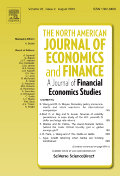
North American Journal of Economics and Finance
Driving innovation through impactful research.The North American Journal of Economics and Finance is a premier academic journal published by Elsevier Science Inc. since 1992, dedicated to advancing the field of economics and finance through rigorous research and scholarship. With an impressive impact factor and recognition in the Q2 category for Economics and Econometrics and Q1 for Finance as of 2023, this journal holds a significant position in the academic community, ranked #41 out of 317 in Finance and #100 out of 716 in Economics. The journal features high-quality, peer-reviewed articles that cover a broad range of topics, from theoretical frameworks to empirical analyses and practical applications. Though not an open-access platform, the journal provides valuable insights for researchers, practitioners, and students alike, promoting knowledge dissemination in the dynamic landscape of economic and financial studies. With its commitment to excellence, the North American Journal of Economics and Finance serves as an essential resource for those seeking to deepen their understanding of contemporary issues in these critical fields.